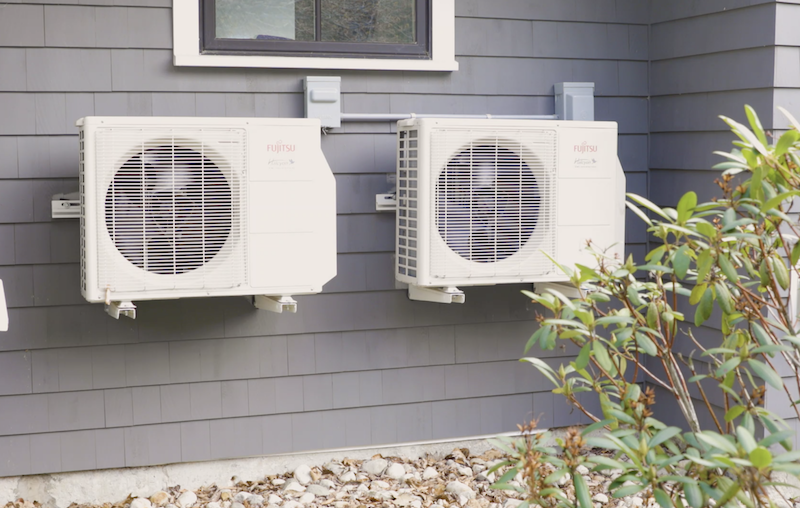
Heat pumps run on electricity and are energy efficient – meaning they can be powered by solar and wind energy and save us money on energy bills. Photo: EcoPhotography.
Flooding, uncharacteristically warm temperatures, and minimal snowfall: These are all symptoms of climate change in New England this winter. It’s clear we need to move away from the fossil fuels warming our planet, like gas, oil, and coal, so we can protect our region for future generations.
One way to do so is to upgrade how we heat our homes and businesses. That’s why a new nine-state pledge to boost electric heat pumps is garnering attention. It holds the promise of booting outdated and polluting gas heating. With Massachusetts, Maine, and Rhode Island all signing on to the pledge, let’s look at five takeaways from this agreement and what they mean for you.
1. Heat Pumps Can Save Money and Cut Pollution
A heat pump uses the difference in the temperature between air inside and outside to heat or cool your home. In the summer, it absorbs heat from inside the building and sends it outside. In the winter, it does the reverse.
This heating technology is far more energy efficient than gas, which means it saves you money while providing the same quality of performance. And because heat pumps are powered by electricity, they can run on clean energy like solar or wind power. That’s why nearly every New England state is prioritizing the installation and affordability of heat pumps through climate laws that charge the state with cutting toxic pollution overheating the planet.
2. Nine States Have Come Together to Champion Heat Pumps
California, Colorado, Maine, Maryland, Massachusetts, New Jersey, New York, Oregon, and Rhode Island have all signed on to boost heat pump installations within their states. They have pledged that 65% of all new HVAC and water heating systems on the market will be electric heat pumps by 2030 and 90% by 2040. They also have promised that 40% of all new investments would go to those who shoulder the worst impacts of climate change (low-income communities and communities of color).
Country-wide action remains difficult in a politically stymied federal government. That’s why this type of multi-state pledge is so important – because where federal progress falls short, states can step up and fill in the gaps for the benefit of families and businesses.
3. This Agreement Builds on a Previous Multi-State Promise
In September 2023, governors Lamont, Mills, Healey, Mckee, and Scott joined 20 other U.S. governors in signing an agreement that promised to similarly cut pollution and heating bills. The agreement pledged to boost heat pump installations in the governors’ respective states, with a goal of installing more than 20 million systems by 2030. The pledge also promises that 40% of these installations will be directed into low-income communities and predominantly Black and Brown neighborhoods.
4. The Pledge Still Allows for Polluting Gas
The pledge is a step in the right direction, but it has some big flaws. With a goal that 90% of new HVAC and water heating systems be electric by 2040, it leaves room for the continued sale of gas-powered systems – which is counterintuitive when the goal of the nine-state pledge is to cut air and climate pollution. The last thing we need is to provide a lifeline to a fuel that is sacrificing our health, climate, and wallets. What we need from our decision-makers is the courage to go all the way with clean energy so we can enjoy safer air, a livable future, and more affordable energy bills.
5. The Heat Pump Pledge Is Not Binding
Just like its predecessor, this pledge is a promise – but it’s not mandatory. It’s a great sign that our state leaders are willing to work together and identify a climate solution that can make a difference in cutting carbon pollution. However, there isn’t anything built into the pledge to ensure leaders own up to their promises or are held accountable to the goals that they set.
We need commitment from our decision-makers, especially when so many have fallen behind on meeting their mandatory climate laws (and, in certain instances, their own heat pump goals, like Massachusetts). With climate change worsening every day, we can’t wait until 2030 or 2040 to realize we’re nowhere near accomplishing our climate goals.
The Heat Pump Pledge: A Good Start, But Not Enough
What we need today is total dedication to action that protects our tomorrow. It’s great to see states work together to cut climate pollution. But we deserve bold progress going all the way with heat pump goals. We also need mechanisms to hold decision-makers accountable for their promises. CLF will continue to be at the table pushing our governors to make commitments that get us to a healthier climate, and to remind them of their promises when action falls short.



